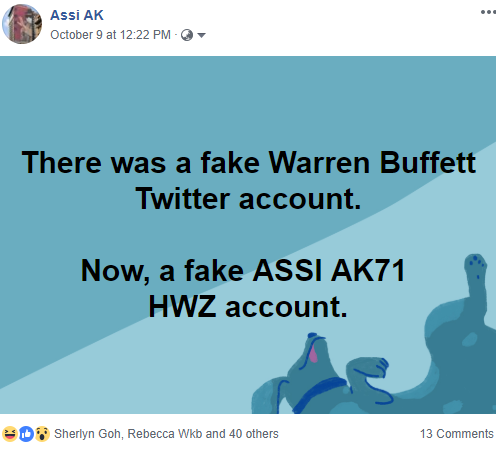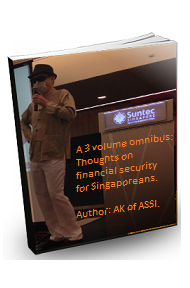What you are going to read later on is a guest blog by Ryan who attended InvestX Congress recently and, in his words, is "trying to put to practice some of the stuff (he) learned there".
Originally sent to me as part of an email for private discussion, I had to admit that this is not something I am conversant with and asked if he would like me to publish this in my blog to see if it would attract some response from other readers. The aim is to generate some discussion.
For those who did not attend InvestX Congress, a
"special situation" in investing could benefit investors even if, in Victor Chng's words,
"the underlying fundamentals of the stock might not pass the typical value investing criteria but the special situation itself provides a nice opportunity for investors to profit."
So, have a read and if you have any thoughts you would like to share, please leave a comment:
SHC Capital Asia -
An Opportunity for "Special Situation" Investing?
What happened:
On the 18th of April, the company announced that it was in discussions about the potential sale of its entire business, triggering a 25% rise in share price from 20c to 25c. This follows an already strong year for the stock, rising steadily from as low as 13c in less than a year.
During the next couple of months, the stock went through a period of high volatility, with the price ranging from 20-30c, until on the 20th of June, the company announced the proposed disposal of SHC Insurance Pte Ltd.
The details:
The purchaser is ERGO International AG- a leading German Insurance company, with premium income amounting to €19bn, and over 50,000 employees. The million dollar number - the agreed consideration - turned out to be S$112.0 million - in cash. That works out to 36.6c per share. After lifting the trading halt, the stock traded in the range of 29-32c. Today, the shares closed at 30.5c, resulting in what I believe to be an opportunity for a short term (3-6 months) gain of 20%.
Further details on the deal:
The agreed consideration is based on the financial position of the company at the end of FY2012. Thus, any change in value of the company from then to the completion date of the deal will be compensated by ERGO. As of 1 January 2014, based on the audited shareholders’ equity, the purchase price will have increased to approximately S$117.5 million. Assuming the company had continued generating value at the same rate, and assuming the deal is completed by 30 June for simplicity's sake - the final consideration will work out to S$120.25 million. However, there are two additional costs involved, namely the transfer amount (1.025m), management retention (0.948m) and dividend (0.857m), which brings the final price to S$117.42 million.
Risks:
Since this is a direct play on the sale of the whole company business, the obvious risk is that of the sale falling through. There are two parts to this- the probability of the sale falling through, and the downside risks if indeed that happens.
First we'll look at the purchaser- it's a huge insurer under the Munich Re group, so we can safely assume this isn't some pump and dump scheme, and the purchaser really does want to make the purchase. The seller is See Hoy Chan, a reputable Malaysian developer. There is also a clear reason for the purchase - the purchaser wants to enter the growing Singapore insurance market. The conditions that needs to be satisfied:
(i)the approval of shareholders of the Company:
SHC Capital Holdings Pte Ltd and Allcare Investment Holdings Pte Ltd, which together hold 81.59% of the co. has promised to support the sale.
(ii) other than the MAS Approval, all other approvals and consents as may be necessary:
This seems likely as MAS has granted its approval in respect of the Proposed Disposal.
The rest are basically clauses ensuring that the co.'s accounts and indications in the discussions are true, and that they are not horsing around. I think there's no indication of why any of them should turn out to be an issue.
Now, let's look at the co. What if we bought now and the sale fell through, and we're stuck with the stock? The co. is an asset light business with recurring income from insurance premiums. Nearly all the assets are liquid - equities, bonds, fixed deposits, insurance premiums due, etc. The co. has essentially no debts, barring insurance contract provisions, which is money set out for expected claims.
Profit wise, $5.095, $5.932, $7,371 million from the 3 years since listing is growing steadily. At the current market cap of $88.7 million, the P/E is 12x - cheap considering how good the business is at creating a recurring stream of income, with little assets and no debt.
With this in mind, I feel that this is a great opportunity for a short term play - I highly doubt that there'll be the chance to hold this co. for long. The closing price today is 30.5c.
P/S: The co. plans to pay out around 30% of the final consideration as a special dividend, and use the rest of the cash for potential new business ventures. This makes it an excellent choice for a reverse takeover, as the shell can be used for quick and cheap listing, and the available cash can be used by a co. listing to expand their business (something most reverse takeover targets cannot provide, unlike IPOs). However, at the moment I'm happy to merely calculate valuation based on the cash after the sale is completed - 38.3c per share. That represents an upside of 25% based on today's closing price (30.5c).
Read Victor's article on "special situations investing":
here.
Related posts:
1.
InvestX Congress: Q&A.
2.
InvestX Congress: Closing thoughts.























